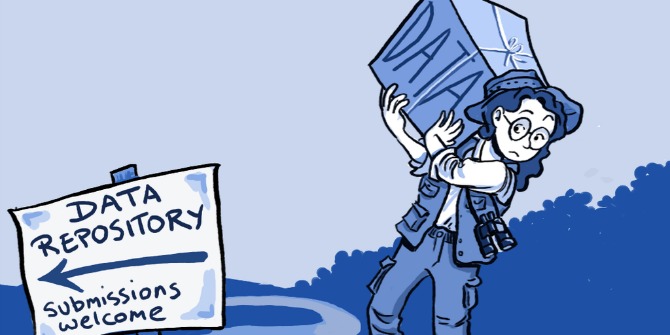 Mark Carrigan finds that academic blogging holds out the possibility of extending the role of the academic, rather than threatening its diminution. It allows for discoverability, less specialised communication, and a degree of space and freedom to extend beyond the realms of research.
Mark Carrigan finds that academic blogging holds out the possibility of extending the role of the academic, rather than threatening its diminution. It allows for discoverability, less specialised communication, and a degree of space and freedom to extend beyond the realms of research.
How do you feel about academic blogging? If you are reading this then, chances are, you feel reasonably well inclined towards it. However if you are an academic blogger then you will undoubtedly be aware that many people are not so well inclined. This raises an obvious question: why? There are many different answers which could be given to this question. Most of which are grounded entirely in anecdotal evidence. This is an issue that is crying out for empirical research. But given its continued absence, I want to focus on one issue which I believe, on an entirely anecdotal basis, to be pertinent – does academic blogging dangerously blur the boundary between research and journalism?
It’s an important question and one which advocates of academic blogging can sometimes dismiss too quickly. Underlying it is an entirely understandable fear of the relatively ephemeral nature of blog posts. The speed with which blog posts come and go, as well as the cultural connotations attached to the term ‘blogging’ itself (not all of which, it must be admitted, are unjustified) may lead many, when confronted with the advocation of academic blogging, to see ‘blogging’ as corrupting ‘academic’.
However I think this misconstrues exactly what academic blogging is. Or at least what it could be. Rather than turning academics into journalists, it actually holds out the possibility of protecting against this. By opening up a distinctive space between academic research and journalism, a thriving academic blogosphere mediates between them. It provides a space for translation, in that blog posts within it will tend, to varying degrees, to communicate in a way that is less specialised than the more familiar modes of academic communication which underwrite both their content and their authority. It also aids discoverability, in that navigating the academic blogosphere as a non-specialist will tend to be intrinsically easier than negotiating the world of staff pages, journals and paywalls.
The crucial point is that academic blogging does not take place in a vacuum. It is grounded in existing research and expertise. The flexibility it affords allows this relationship to be a dynamic one – blogging can be underwritten by research conducted, in progress or is merely planned. It also provides a degree of space and freedom to extend beyond the realms of research. It is widely acknowledged that social media offers new possibilities for public intellectualism but what is much less understood is the transformed nature this can take. Rather than the broadcasting which defined the public intellectuals of the 20th century, social media facilitates ‘narrowcasting’ – relatively narrow audiences can be reached, with little or no funding needed, facilitating a broader and much more democratic relationship between academics and various publics.
Academic blogging holds out the possibility of extending the role of the academic, rather than threatening its diminution. I share many of the fundamental concerns which I hear expressed about impact and public engagement – particularly the entirely justified fear that this agenda, as well as the broader changes within higher education within which it is unavoidably implicated, threaten the autonomy of academic work. I think there’s a risk that the production of academic knowledge (in the broadest sense of the term) becomes subjugated to the contingencies of the political cycle, particularly as its mediated by funding bodies and other intermediaries.
Part of the difficulty stems, I think, from the unavoidably top down way in which ‘impact’ and ‘public engagement’ are introduced and enacted. But I’ve always felt conflicted about this issue because, at least when they are construed in ‘bottom up’ terms, I’ve both enjoyed them personally and increasingly seen such activities as important. Using social media has helped give my research a media profile which otherwise would have been impossible, particularly at this stage of my career. It’s made me easy to discover for journalists and it’s helped me forged a rich array of connections with the broader community who have been the subject of my research. I’ve also found that, increasingly, journalists have read my blog posts or listened to my podcasts before they contact me and it hugely aids the subsequent dialogue. The use of social media can help get academic knowledge into a public forum in a form which is broadly comprehensible but not simplified. In doing so, it helps ameliorate some of the more problematic issues that can emerge from the culture clash of academic knowledge and journalistic constraints. Far from subjugating research to journalism, actively participating in this making public of academic knowledge will actually fortify academia against the intrusions of media imperative i.e. the academic blogosphere mediates between academia and the media.
What is recounted above is simply my own personal experience but it’s one which, I’m sure, others have had. Furthermore, it seems likely that as academic blogging becomes more widespread, so too will this experience. Likewise as, for a variety of reasons, organizations invest in multi-author blogging projects which facilitate broader engagement (allowing those who only want to write an occasional blog post to get traction for their writing online) and add value to the content through curation and editing. Imagine if blog posts recounting the aims, arguments and findings of research papers become as ubiquitous as abstracts? What would the effects be? Among many others, it would likely make academic knowledge navigable to a great majority of people who are otherwise excluded from it. Rather than reducing scholarship to blogging, the former is extended through the latter, giving it a public visibility which it currently lacks and making it available in a way in which it currently isn’t.
Note: This article gives the views of the author(s), and not the position of the Impact of Social Sciences blog, nor of the London School of Economics.
Mark Carrigan
Mark Carrigan is Managing Editor of LSE’s British Politics and Policy blog and a third year PhD student in Sociology at the University of Warwick. His PhD research is a longitudinal study of identity and culture involving ongoing in depth interviews with 18 undergraduate students over two years. He also conducts research on asexuality and sexual culture, with an edited book Asexuality Studies and a special issue of the international journal Psychology & Sexuality on these themes due for publication in 2012. He is an enthusiastic advocate of social media within academic life, currently editing the website Sociological Imagination and the Sociology@Warwick blog.








Mark this is a really timely and interesting article. I agree with your sentiment that academic blogging could extend, rather than threaten, the role of the academic. This type of extending is already taking place in other professions (e.g. health and wellbeing).
I would further argue, conversely, that in the case of the printed (and perhaps TV) journalism, the failure of many practitioners to fully engage with blogging and bloggers – and social media in general? – has threatened and damaged the profession.
I agree completely that academic blogging is founded upon research and only serves to enrich the academic discussions that are created. Michelle Lin, founder of the blog that I write for, academiclifeinem.blogspot.com/ makes the analogy that blogging has now become the new office “water cooler”. Blogging is where discussions are held, points are argued.
I also agree completely that blogging allows the academics to carve out that unique space between academics and media and to create a common ground on our terms that we can protect and control.
I only believe that social blogging will expand and become the future standard of sharing and spreading academic theory and discussion.
Great post!
How many times have we heard colleagues bemoan the fact that those we most want to reach with our research never read it. Blogging to me is a form of knowledge mobilization and a way of helping to better practice. It is important to get out of our seats and make time to enter into these discursive spaces and have real conversations about impact and understandability. I feel that academic blogging allows the academic to occupy the space between theory and practice and serve as a conduit between the two. A valuable blog. Thanks for the contribution.
Thanks for the interesting post Mark! I agree with your thoughts that blogging has the potential to make academic research accessible to a wider audience. By it’s very nature, the “blog” medium necessitates that ideas are communicated in a concise, clear and interesting manner – all positive effects. In my opinion, it is not the medium of blogging which stands to “blur the boundary between research and journalism”, but rather the HASTE that one feels when interacting with this new medium.
I am all for non academic writing (whether blogging, opinion pieces, commentary, etc.), however, I do think that the freedom of the individual researcher to contribute to public debate is threatened when blogging and tweeting about one’s work becomes part of the job description and is performance managed (and institutionally filtered). For how can you say what you truly believe your research is about when instructed by your boss to “disseminate” the research to non-academic audiences (assuming your views may differ in important respects)? Personally, I would prefer it if blogging became less a part of the academic job description and more a contribution to civic debate in a personal capacity, as and when the researcher feels they can meaningfully contribute.